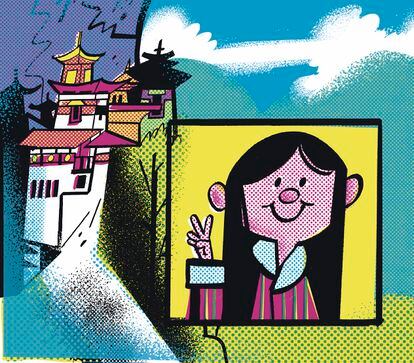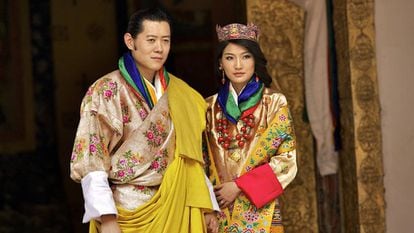
Advertising billboards are strictly prohibited on the roads of Bhutan. Instead, the signs focus on praising the king and promoting a specific way of life. Some messages are universal, like “Don’t use your phone while driving and maintain a safe distance.” Others are more hard-hitting, like “One bad choice can ruin your life. Say no to drugs.”
Bhutan, known as the Switzerland of the Himalayas, is one of the world’s youngest constitutional monarchies. Situated between China and India, it has a population of less than a million and boasts several unique features. Notably, there is a ministry that developed the Gross National Happiness (GNH) index, which assesses citizen well-being through regular surveys. The survey results have become a key tool for planning and evaluating public policies, says researcher Luis Rodríguez Calles. According to Dr. Marta Miret of the Autonomous University of Madrid, evaluating societal progress through well-being indicators is not limited to Bhutan. Canada, Australia, France, the United Kingdom and the United Nations all acknowledge the importance of happiness in public policy development and have started systematically assessing the well-being of their own citizens.
Bhutan’s GNH index stands at 0.756 on a scale of 0 to 1. In Bhutan, 43% of survey respondents reported feeling happy or very happy, 48% said they were relatively happy, and 9% declared themselves unhappy. Research by Miret and Dr. José Luis Ayuso-Mateos (also from the Autonomous University of Madrid) found similar levels of happiness in Spain.
Surprisingly, Bhutan’s GNH declined after the introduction of television and the internet in 2000. Since then, many young Bhutanese like filmmaker Pawo Choyning Dorji have expressed a desire to leave the country. Dorji’s film, Lunana: A Yak in the Classroom was nominated for Best International Feature Film at the 94th Academy Awards in 2022.
The Gross National Happiness Index evaluates multiple aspects of life in Bhutan: living conditions, psychological well-being, health, use of time, education, cultural resilience, good governance, community vitality and ecological resilience. It explores factors like assets, housing, per capita income, life satisfaction, mental health, work, sleep, literacy, cultural participation, fundamental rights, family and responsibility towards the environment.

The index is used to support four main public policy pillars. The first focuses on developing a sustainable and egalitarian socioeconomic system and providing free healthcare. The second aims to protect and promote cultural values, including religion, language, dress and architecture. The third emphasizes environmental conservation, given that 60% of the country is forested. This involves measures like banning plastic bags and smoking in public spaces. Additionally, there are strict controls on tourism, requiring visitors to go through local agencies and be accompanied by a local guide. The fourth pillar focuses on maintaining a corruption-free government.
Visitors describe Bhutan as peaceful and stress-free — an abrupt change from the fast pace of the West. Kindness and patience are expressed in the warm smiles of the people, while Buddhist statues exude tranquility. Streets, fortresses and temples are immaculately clean. Vibrant red and green houses are adorned with an abundance of plants. Administrative tasks are efficiently handled by uniformed officials. The absence of traffic lights is a testament to the smooth flow of traffic. Commutes are short and most citizens are farmers. The people take pride in being citizens of Bhutan.
You don’t need to travel to Bhutan or become a Buddhist monk to explore their concept of happiness. But we can and should take a long look at this culture to see what lessons we can learn. In Notebooks of a Wandering Monk, the memoirs of renowned Buddhist monk Matthieu Ricard, he reflects on how our culture often associates happiness with achieving goals, acquiring possessions, professional accomplishments and, more lately, seeking validation on social media.
Transferring or exporting this set of GNH indicators to our environment and lifestyle isn’t easy. But perhaps Bhutan’s GNH can inspire some social experiments by local civic and political entities. Think about the things that shape our own happiness index. Are the pillars that support it stable or fragile? Consider the time you spend at work and with friends, family, community, spiritual and artistic pursuits, social rituals and connecting with nature. Do you have the wherewithal and courage to make some changes?
Sign up for our weekly newsletter to get more English-language news coverage from EL PAÍS USA Edition